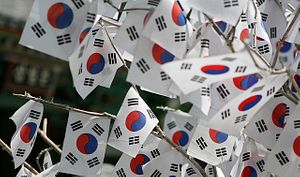As Washington continues to grapple with how to clinch winning trade deals, unease persists about whether the White House may back out of existing free trade agreements. Given that one of the first actions President Donald Trump took after taking the oath of office was to withdraw the United States from the Trans-Pacific Partnership agreement, his expressed interest in backing out of a bilateral free trade deal with South Korea is hardly surprising. Yet the possibility of withdrawing from KORUS will come with a far higher price tag than retreating from the TPP, not least because Washington needs solid relations with Seoul more than ever as a result of ever-increasing concerns about North Korea. This is hardly the time to challenge South Korea about trade rules on the one hand, while pushing for closer bilateral cooperation on the military front to tackle Kim Jong-un’s regime.
After all, Seoul has already paid a high price for approving deployment of the U.S.-supplied Terminal High Altitude Area Defense (THAAD) system on its shores, as China has launched a de facto trade sanction against the ROK in protest. In particular, Korean supermarket giant Lotte has suffered as a result of the ongoing dispute between Beijing and Washington over THAAD, as mounting Chinese pressure to boycott and prevent the company from doing business in the country forced the company to effectively withdraw from Chinese markets in September. Carmaker Hyundai too has seen sales to China, which is its biggest foreign market, plummet by 64 percent from a year ago. The tourism industry has taken a hit too, as the number of Chinese visitors visiting the ROK has dropped precipitously, the number of group tours in particular have plunged. Nevertheless, rather than follow through on his campaign promise to hold back on THAAD, South Korean President Moon Jae-in has actually stepped up Korean commitment to the defense system by pressing for its full deployment in response to the latest slew of North Korean missile launches, in spite of the high economic as well as political costs of the decision. If the United States were to withdraw unilaterally from the trade deal with South Korea, it would be a blow to the Moon administration at a time when the world needs a strong ROK leadership.
But withdrawing from or even aggressively attacking KORUS would have far greater consequences from an economic perspective than pulling out of the TPP. Granted, the multilateral TPP is far more ambitious than the bilateral KORUS. But TPP had never been implemented, and ongoing discussions about a possibility of pursuing the TPP without the United States is precisely just that: a possibility. As such, U.S. businesses had never benefited from being part of the trade deal. In short, withdrawing from TPP did not take away from anything that already existed from an economic perspective. It simply took away the possibility of what could have happened. KORUS, on the other hand, has already been in place for the past five years.
Critics have argued that since the implementation of KORUS, the U.S. trade deficit with Korea has nearly doubled to over $28 billion, and that the deal has been only increased Seoul’s advantages to access U.S. markets. Still, in absolute terms, exports of U.S. manufactured goods have risen in the key auto, pharmaceutical, and machinery sectors, as well as agricultural goods. After all, there were effectively no American-made cars sold in South Korea before KORUS, whereas now U.S. cars can be sold in the ROK effectively tax-free. But more importantly, exports of U.S. services have surged 35 percent and have enhanced market access for U.S. financial institutions, telecommunications providers, travel groups, and management service providers. A withdrawal from KORUS would be a blow to those competitive U.S. industries, and take away opportunities for manufacturers to fully take advantage of barriers being lifted by KORUS.
Granted, KORUS is not without its faults, and it can certainly benefit from updates, including digital trade that was not incorporated into the original agreement. Efforts that are now being made by South Korean Trade Minister Kim Hyun-chong to continue discussions to reassess the deal with U.S. Trade Representative Robert Lighthizer should be welcomed. The bilateral dialogue should be seen as a win-win for both sides because it will be an opportunity to update and strengthen the agreement as needed, especially on issues that were not included initially such as digital trade.
While initial fears of KORUS being scrapped altogether have abated, anxiety remains about how the Trump administration might revisit the deal in the future. Given the key role that the trade agreement plays in furthering bilateral relations at a time when Washington needs to have solid ties with Seoul more than ever, this is hardly the time to jeopardize bilateral relations. But KORUS has already been beneficial for U.S. businesses in the services sector, and could lead to gains for manufacturers as well. Retreating from the deal now would only hurt those critical U.S. industries.
Shihoko Goto is the Senior Associate for Northeast Asia with the Woodrow Wilson Center’s Asia Program based in Washington DC.

































